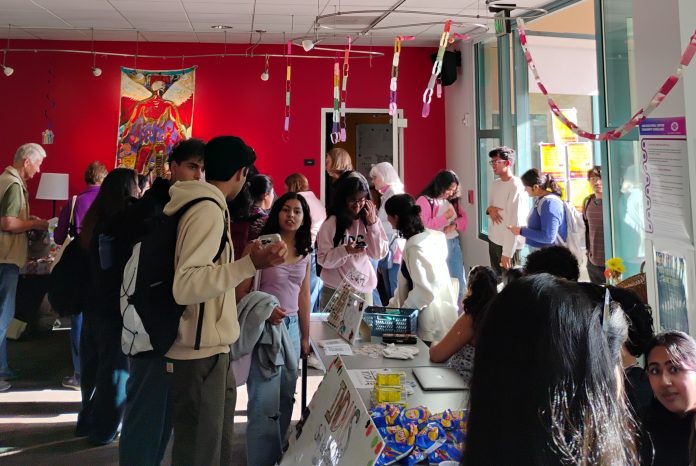Jeovany Tzilin Gomez
Contributing Writer
UC Santa Barbara’s (UCSB) students collectively celebrate Middle Eastern, North African, and South Asian (MENASA) culture through small businesses, food, and music. The Multicultural Center (MCC) along with the MENASA Resource Center (MENASARC) celebrated Arab American Heritage Month on April 21st as they hosted their annual Bazaar.
Featuring student-owned businesses, free food from Apna Indian Kitchen, and a performance by UCSB’s Middle Eastern Ensemble, the event celebrated MENASA communities, emphasized the significance of MENASA cultures, and acknowledged the first month of the Iranian New Year. The event took place in the MCC lounge and was coordinated by Marina Habib from the MCC and Ashkon Molaei from MENASARC. In an interview with The Bottom Line, Habib and Molaei talked about their experience with organizing the event, including challenges that appeared during planning.
As a program coordinator, Habib had the event in her belt because she helped organize the previous Bazaars. “When you’re planning events, there’s a whole lot that goes into it,” she said. “[I feel like] the most difficult part is just getting everybody on board in a timely manner.”
Habib mentioned that organizing events like the Bazaar with people can help strengthen connections. She explained, “There’s beauty in meeting other people on the same wavelength who have the same intention you do and want to create the same impact and give back to the community in the same capacity.”
As a previous member of the Persian Student Group, Molaei commented, “The Bazaar kind of became the signature event because it was the one that brought together the most student [cultural] organizations throughout the entire academic year.”
Moleai also talked about the Bazaar being an essential event for MENASA students. He further characterized it as an event “where student organizations can come, collaborate, and represent their student organizations and communities on campus and showcase their culture in any capacity they want.”
The guests in the Bazaar were able to check out the student-owned businesses selling jewelry, stickers, and, most importantly, food! The Arab Student Group sold knafeh, shredded filo dough layered with cheese and soaked syrup, UCSB Indus sold imported goods like potato chips and juice boxes, and the Pakistani Student Association (PSA) were selling rose milk.
Sammy Ali, a vendor and representative of PSA, explained how Arab small businesses can help consumers reconnect with their cultural roots. “By selling this [knafeh] that hits close to home, people can think about [how] it brings them back home,” Ali said. “It’s just a way for people to feel connected to their Arab culture, even at a place like UCSB.”
Ali also mentioned how the Bazaar gives an opportunity for marginalized vendors to be successful in their businesses. “People are here to support marginalized groups [and] support cultures, so [the event] does promote these like minority small businesses because it gives them a platform to represent their own culture rather than just [promoting] a transactional business.”
Aside from the vendors, UCSB’s Middle Eastern Ensemble performed several songs that originated from different cultures in the Middle Eastern regions, such as Syria, Egypt, and Turkey. The ensemble consisted of an oud player, a flute player, a clarinet player, and two hand drummers.
Aleeze Ali, an attendee of the event and a member of the PSA, emphasized the importance of learning about MENASA cultures and how diverse they can be. Ali said, “People [at UCSB] really don’t recognize just how diverse the population they have and how many different cultures come together and how much rich history, including, you know, colonization and all these different tribes [and] how much of that contributes to what we see now.”
Habib emphasized that there’s power in the community when they come together to celebrate each other’s cultures, especially Arab cultures. She said that people don’t need to be bold, but have compassion, sympathy, and kindness for one another, especially when they are going through difficult situations like discrimination. “I feel like that is what makes [our cultures] great and what has allowed us to survive all of these years,” Habib said.
People can check out the MCC and MENASARC websites for more information on student resources as well as upcoming events.











